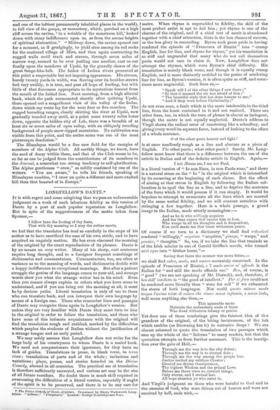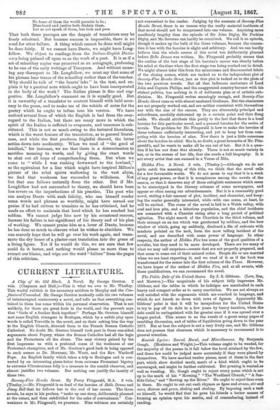LONGFELLOW'S DANTE.* Iv is with regret and some misgiving that
we pass an unfavourable judgment on a work of such laborious fidelity as this version of Dante by a poet of such popular reputation as Longfellow. But in spite of the suggestiveness of the motto taken from Spenser,—
I follow here the footing of thy feete,
That with thy meaning so I may the rather meete,
we feel that the translator has trod so carefully in the steps of his author as to have sacrificed the ease of his own stride, and to have acquired an ungainly motion. He has even obscured the meaning of the original by the exact reproduction of its phrases. Dante is by no means an easy writer. Many of his sharp, curt sentences require long thought, and to a foreigner frequent searchings of dictionaries and commentators. Commentators, too, are often at variance as to the meaning of words, and dictionaries decide with a happy indifference to exceptional meanings. But after a patient struggle the genius of the language comes to your aid, and strange words show you what the strange writer has in his mind. Even then you cannot always explain to others what you have come to understand, and if you can bring out the meaning at all, it must be by devious paths. Literal translation is only of use to those who can translate back, and can interpret their own language by means of a foreign one. Those who remember lines and passages of Dante may recognize them again in Longfellow's version. But unless they are very familiar with Dante they must turn to him in the original in order to follow the translation, and those who have none of this intimate acquaintance with the original will find the translation rough and crabbed, marked by the difficulties which perplex the students of Italian without the justification of a strange tongue and an early period.
We may safely assume that Longfellow does not write for the large body of his countrymen to whom Dante is a sealed book. We need not compassionate their ignorance, for they have no lack of guides. Translations in prose, in blank verse, in terza -rima ; translations of parts and of the whole ; imitations and variations ; plays, poems, and stories founded on the Divine Comedy, abound in all countries. The practical use of translation is therefore sufficiently answered, and curious art may be the aim of all future versifiers. No doubt there is much skill required in overcoming the difficulties of a literal version, especially if aught of the spirit is to be preserved, and there is to be any care for
• Vie DitaAe Comedy of Dante Alighieri. Translated by Henry Wadsworth Long- fellow. "inferno." rurgatorlo." London: George Houtiedge and SAIL
metre. When rhyme is superadded to fidelity, the skill of the most perfect artist is apt to fail him ; yet rhyme is one of the charms of the original, and if a chief teat of merit is abandoned.
together with a chief attraction, there is the less chance of success, or the less glory in succeeding. Byron took great pride in having rendered the episode of " Francesca of Rimini " into " cramp English, line for line, and rhyme for rhyme," yet his translation is so stiff and ungraceful that many who do not call themselves
poets would not care to claim it. Now, Longfellow does not attempt the rhymes, which were Byron's chief difficulty. His translation is merely blank verse, and though it is equally cramp English, and is more distinctly entitled to the praise of rendering line for line, as Byron's version, it is often quite as stiff, and some- times more ungraceful. Such lines as,— "Speak will I of the other things I saw there ;" "So that it seemed the air was afraid of him ;" "The beautiful style that has done honour to me ;" "And if they wore before Christianity ;"
do not even scan, a fault which is the more intolerable in the third line, from the boast contained in it and not realized. There are other lines, too, in which the turn of phrase is almost as inelegant, though the metre is not equally neglected. Dante's address to Virgil shows the radical error of construing like a schoolboy, and giving:every word its separate force, instead of looking to the effect of a whole sentence.
0 of the other poets honour and light !
is at once needlessly rough as a line and obscure as a piece of English. The other poets ; what other poets ? Surely, Mr. Long-
fellow must know that there is a difference between the use of the article in Italian and of the definite article in English. Again,— I not .lneas am, I am not Paul,
is a literal version of " Io non Enea, io non Paolo sono," and there is a natural stress on the " Io " in the original which is intensified by its recurring at the beginning of each clause. But the effect of aiming at that stress in English by following the Italian col- location is to spoil the line as a line, and to deprive the sentence of the force which it would possess if it ran simply. It would be hopeless to attempt to enumerate all the lines which are marred
by the same verbal fidelity, and we will content ourselves with stringing a few together. Here is a whole passage, a grand image in the Italian, made utterly meaningless:— And as he is who willingly acquires
And the time comes that causes him to lose, Who weeps in all his thoughts and is despondent, E'en such made me that beast withonten peace.
Of course if we turn to a dictionary we shall find volenlieri rendered " willingly," acquista " acquires," piange, " weeps," and pensier, " thoughts." So, too, if we take the line that reminds us of the Irish scholar in one of Gerald Griffin's novels, who turned acri equo into " bitther horse,"--
Saving that there the manner was more bitter,— we shall find salvo, ntodo, and amaro accurately construed. In the
episode of Francesca of Rimini, c '1 modo ancor offends is the
Italian for "and still the mode offends me." Ben, of course, is " good " (we are not speaking of Mr. Disraeli), and, therefore, it ben dell' intelletto is " the good of intellect." Per se foro could not be rendered more literally than " were for self " if we exhausted
the stores of both languages. Nor could questo miser° mode tengon l'anime triste di coloro the visser senza infantia, e senza lock, well mean anything else than,— This miserable mode
Maintain the melancholy souls of those Who lived withonten infamy or praise.
Yet does one of these renderings give the faintest idea of th e grandeur of the original, of the biting incisiveness, of the ink which rankles (as Browning has it) in corrosive drops ? We are almost ashamed to quote the translation of two passages which sum up the whole of the " Inferno" to many readers, but that the quotation exempts us froni further comment. This is the inscrip- tion over the gate of Hell,— Through me the way is to the city &lent ; Through me the way is to eternal dole ; Through me the way among the people lost. Justice incited my sublime Creator ; Oreated me divine Omnipotence, The highest Wisdom and the primal Love. Before me there were no created things, Only eterne, and I eternal last.
All hope abandon ye who enter in.
And Virgil's judgment on those who were hateful to God and to the enemies of God, who were driven out of heaven and were not received by hell, ends with,— No fame of them the world permits to be; Misericord and justice both disdain them.
Let us not speak of them, but look and pass.
That both these passages are the despair of translators may be freely admitted. But because success is impossible, there is no need for utter failure. A thing which cannot be done well might be done fairly. If we cannot have Dante, we might have Long- fellow. We object to readings from the Italian-English Dictio- nary being palmed off upon us as the work of a poet. It is as if a set of schoolboy copies was preserved as an autograph, professing to be one of the early writings of Tennyson. And without mean- ing any disrespect to Mr. Longfellow, we must say that some of his phrases bear traces of the schoolboy rather than of the teacher. Why should he talk of "the hearts' lake" in the text, and ex- plain it by a poetical note which ought to have been incorporated in the body of the work ? The Italian phrase is fine and sug- gestive. Mr. Longfellow's comment on it is equally good. But it is unworthy of a translator to content himself with bald accu- racy in the poem, and to make use of the vehicle of notes for the poetry which he ought to infuse into his version. We have noticed several lines of which the English is bad from the over- regard to the Italian, but there are many more in which the spirit of the Italian is suffered to evaporate, and tameness is sub- stituted. This is not so much owing to the tortured literalness, which is the worst feature of the translation, as to general literal- ness, and while the first produces frightful discord, the latter settles down into -mediocrity. When we read of " the good of intellect," for instance, we see that there is a determination to sacrifice meaning to words, and by giving the exact words to shut out all hope of comprehending them. But when we come to " while I was rushing downward to the lowland," as the equivalent for a line which might have inspired Milton's picture of the rebel spirits wallowing in the vast abyss, we find that weakness has succeeded to wilfulness. Not but that one follows naturally from the other. But if Mr. Longfellow had not succumbed to theory, we should have been less severe on the imperfections of his practice. The poet who can analyze Dante with such felicity, who can himself render some words and phrases so worthily, might have earned our praise if he had striven to translate as he has criticized, had he made an effort to maintain that level which he has reached but. seldom. We cannot judge him now by his occasional success, because his failure is too significant of his theory and of his plan of working. We cannot praise him as a lover of Dante, because be has done so much to obscure what he wishes to elucidate. We can scarcely hope that he will go over his work again, and trans- mute the dry bones of a plaster-cast translation into the grace of a living figure. Yet if he would do this, we are sure that few could do it better, and nothing would please us more than to retract our blame, and wipe out the word "failure" from the pages of this criticism.































 Previous page
Previous page